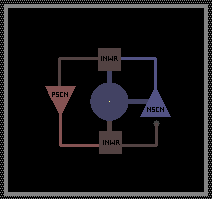Difference between revisions of "Element:INWR"
(Undo revision 5545 by SopaXorzTaker (talk), and fixed some incorrect information) |
(fixed element icons) |
||
| Line 43: | Line 43: | ||
=== Properties === | === Properties === | ||
| − | Insulated Wire's description is misleading, as it does, in fact, conduct to some semiconductors ({{ | + | Insulated Wire's description is misleading, as it does, in fact, conduct to some semiconductors ({{MaterialBtn | PSCN}} and {{MaterialBtn | NSCN}}), though it ''does'' not conduct to {{MaterialBtn | PTCT}} and {{MaterialBtn | NTCT}}, or any other elements. |
| − | A beam of {{ | + | A beam of {{MaterialBtn | BRAY}} normally blocks other beams of white {{MaterialBtn | BRAY}}, unless the space where they would cross has a particle that is transparent to {{MaterialBtn | BRAY}} ({{MaterialBtn | FILT}}, {{MaterialBtn | INWR}}, {{MaterialBtn | ARAY}}, etc.) For some reason, {{MaterialBtn | INWR}} is most commonly used for this. |
== Uses == | == Uses == | ||
It can allow creation of "crossings", because it does not conduct to most metals. | It can allow creation of "crossings", because it does not conduct to most metals. | ||
It is also used as ROM in printers to store the image, and in decoders. | It is also used as ROM in printers to store the image, and in decoders. | ||
| − | It can be used as a destroyable replacement for | + | It can be used as a destroyable replacement for {{MaterialBtn | INWR}}. |
=== Examples === | === Examples === | ||
Revision as of 19:43, 16 July 2015
 Insulated Wire. Doesn't conduct to metal or semiconductors. | |
| Properties | |
|---|---|
| Section | Electronics |
| Spawn temperature | 22°C |
| Heat Conductivity | 100% |
| Relative weight | 100 |
| Gravity | 0 |
| Acid dissolve rate | 0.1% |
| Flammability | 0 |
| State | Solid |
| Transitions | |
| High temperature |
|
| Misc properties | |
| Conducts electricity (SPRK) | |
| Source code | |
Insulated Wire. Doesn't conduct to metal or semiconductors.
(not true)
Properties
Insulated Wire's description is misleading, as it does, in fact, conduct to some semiconductors (![]() and
and ![]() ), though it does not conduct to
), though it does not conduct to ![]() and
and ![]() , or any other elements.
, or any other elements.
A beam of ![]() normally blocks other beams of white
normally blocks other beams of white ![]() , unless the space where they would cross has a particle that is transparent to
, unless the space where they would cross has a particle that is transparent to ![]() (
(![]() ,
, ![]() ,
, ![]() , etc.) For some reason,
, etc.) For some reason, ![]() is most commonly used for this.
is most commonly used for this.
Uses
It can allow creation of "crossings", because it does not conduct to most metals.
It is also used as ROM in printers to store the image, and in decoders.
It can be used as a destroyable replacement for ![]() .
.
Examples
| This shows an example of INWR not conducting to METL. | 44303View save 44303
|
| Language: | [[::Element:INWR|English]] |
|---|